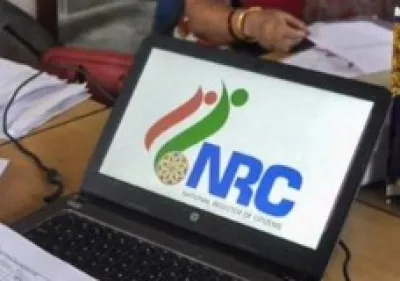Did Mehbooba Mufti Just Accuse the NC Government of Wasting 99% of Apple Crop?

Synopsis
Key Takeaways
- 99% of the C-grade apple crop in the Valley is reported to have gone to waste.
- Mehbooba Mufti criticizes the NC government for failing to implement the MIS.
- The horticulture sector supports over 700,000 families.
- The industry contributes approximately Rs 10,000 crores to J&K's economy.
- Immediate action is needed to revive the horticulture sector.
Srinagar, Sep 21 (NationPress) Mehbooba Mufti, the former Chief Minister of Jammu and Kashmir and President of the Peoples Democratic Party (PDP), has criticized the National Conference (NC) for permitting an astonishing 99 percent of the Valley's C-grade apple crop to deteriorate due to the failure to implement the Market Intervention Scheme (MIS).
In her statement, Mufti pointed out that the negligence of the horticulture sector has led to the waste of nearly all of this year's C-grade apple crop because the NC government, under Chief Minister Omar Abdullah, did not activate the MIS meant to bolster the horticulture industry.
She highlighted that her late father, Mufti Mohammad Sayeed, was a visionary leader who understood the significance of the economy of J&K and always regarded the fruit industry as the region's economic backbone.
"The horticulture sector supports over 700,000 families, yields annual revenues between Rs 5,000 to 6,000 crore, and contributes approximately 8 to 9 percent of J&K's GDP. Mufti Sahib viewed this sector as essential to life, not just a seasonal issue," she said.
"He abolished toll taxes on fruit transport, established mandis across districts for improved market access, introduced the MIS to buy C-grade apples, thus preventing distress sales, and initiated the High-Density Plantation Scheme to modernize horticulture and boost productivity," the PDP President added.
She accused the NC government of intentional neglect, stating: "For many years, NC administrations have regarded horticulture as an afterthought. This year, by not enforcing the MIS, they allowed almost the entire stock of low-grade fruit, nearly 99 percent, to decay and go to waste."
"Growers, already grappling with frequent highway closures, natural disasters, and escalating expenses, have been pushed to their limits," she emphasized.
She asserted that this inaction not only reflects incompetence but also a disregard for the backbone of J&K's economy.
"Fruit growers are not seeking charity. They demand fairness, the continuation of the MIS, and assured access to markets. The NC’s oversight has jeopardized an entire community and weakened the rural economy," she declared.
She called on the NC government to promptly revive and expand the MIS, guarantee seamless truck movement along the Srinagar–Jammu highway, and recognize horticulture as a permanent cornerstone of J&K's economic strategy, rather than a secondary concern.
Horticulture, not tourism, constitutes the largest industry in Kashmir.
The horticulture sector contributes Rs 10,000 crores to the economy of the union territory each year.
Apples are the foundation of Kashmir's horticulture industry, alongside cherries, walnuts, almonds, peaches, and pears, which are also cultivated in the Valley and marketed beyond J&K.
This year, apple growers and traders have incurred significant losses due to the ongoing blockades of the Srinagar-Jammu national highway, causing their harvested apples to spoil in stranded trucks.
In the past three days, over 6,000 trucks transporting apples have traveled along the Srinagar-Jammu highway and the Mughal Road, connecting Shopian district with Poonch in Jammu division.









